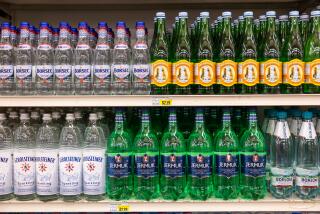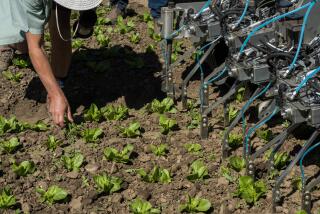Farmers Planting Cream of the Crop : Market Is Growing for Unique Produce That Suits Consumer Taste
- Share via
It wouldn’t work without the bees. Swarming through a field in Irvine, they carry pollen from the flowers of ordinary watermelon plants to alternating rows of hybrid plants incapable of producing fruit by themselves.
The cross-pollenization creates distinctive round, pale green “mule” watermelons interspersed among the traditional oblong, dark-green picnic melons.
Although the bees don’t know the difference, the seedless mules have become a popular attraction in supermarket produce departments.
Seedless watermelons and improved varieties of red peppers and tomatoes were harvested this year on 515 acres of Irvine farmland leased by Treasure Farms, an Orange County agricultural company. The firm is growing the new products under contract with Sun World International, an Indio-based marketing organization that is promoting them under its own label.
Such growers as Treasure Farms and marketers as Sun World are on the leading edge of a national movement by produce farmers, distributors and seed companies to obtain exclusive rights to grow and sell novel varieties of fresh fruit and vegetables in demand by a generation of health-conscious consumers.
The face of agriculture, traditionally an anonymous enterprise that has generated slim profit margins and undistinguishable commodities, is changing as entrepreneurs at various points along the produce chain begin to compete for market recognition and premium prices by offering unique products.
Orange County long has been an attractive area for production of high-value crops, starting with strawberries and asparagus. The county’s mild coastal climate protects sensitive fruits and vegetables, which fetch higher prices than hardier products.
Barbara Buck, spokeswoman for the Irvine-based Western Growers Assn., also noted that in Orange County, “you need high-cash-value crops because land is scarce and expensive, and water is expensive, and labor is expensive.”
Moreover, Howard Marguleas, chairman of Sun World and a director of the Irvine Co. since 1977, has encouraged new farming methods on the Irvine Co.’s extensive agricultural landholdings in Orange County. It was Marguleas who influenced the Irvine Co. last year to begin growing seedless watermelons and sweet red peppers to be marketed by Sun World. When the Irvine Co. discontinued row-crop farming this year, Treasure Farms took over the melon and pepper production under a tenant farming arrangement.
Genetic experimentation is generating a constantly expanding cornucopia of new fruit and vegetable varieties. Researchers are developing such exotics as miniature lettuce, golf-ball-sized cantaloupe, and orange, purple and ivory peppers. Other new proprietary produce items include carrots with increased vitamin content, corn that stays sweet on the shelf and tastier tomatoes with redder pulp.
More Offerings
John Rodgers, marketing operations manager for Safeway Stores in Southern California, said that in the last five years, the number of produce items offered in an average Safeway store has doubled to more than 300 from about 150, including up to 19 varieties of melons, 20 varieties of squash and 11 varieties of mushrooms.
The craving of today’s shoppers for fresh fruits and vegetables, Rodgers said, has greatly enhanced the prestige of the supermarket produce section, which has attained equal stature with the meat counter as a customer draw.
Leo Zanoni, a spokesman for Asgrow Seed in Kalamazoo, Mich., said the company has been introducing 25-50 new seed products annually. A decade ago, he said, Asgrow offered 15 new or improved vegetables a year.
In the past, Zanoni said, industry research focused almost entirely on developing new seed that would provide the higher yields and increased disease resistance desired by growers.
Today, he said, researchers are placing more emphasis on features valued by consumers, such as improved taste, more pleasing colors, increased variety and convenience.
To gain customer allegiance, some growers, marketers and seed companies are beginning to attach brand names to a broad range of produce, such as Asgrow’s Mission cantaloupes, Bud of California’s Bud Special celery and Abbott & Cobb’s Summer Sweet corn.
Noting the increasing trend toward distinctive products, enhanced quality and brand recognition, Tom Echlin, advertising manger for Superior Farming of Bakersfield, predicted that “in five years, this business will be dramatically different from what it is now.”
This year, Echlin said, Superior Farming began putting brand stickers on all of its fruits and calling attention to patented varieties with special packaging and labeling.
Echlin said competition is fierce among table grape and stone fruit growers, such as Superior Farming, because fruit production is increasing at a much faster rate than the population of potential consumers.
“We found the best way to be assured of a premium position (in such a competitive marketplace) is to have something no one else can produce,” he said. In the last two years, Superior Farming has “definitely intensified” its research and has been introducing about three new patented products a year. The company now has about 30 fruit patents.
Abbott & Cobb, a wholesale vegetable seed distributor in Feasterville, Pa., has formed a separate marketing organization called Summer Sweet to assist farmers who plant its special hybrid corn seed. Generally, the company said, Summer Sweet brand corn commands a wholesale price that is $1 to $2 per crate higher than other varieties of corn.
Bill Heintz, president of Bud of California, a Salinas-based vegetable growing subsidiary of Castle & Cooke, said development of new vegetable varieties is “a matter of survival.”
Patented Celery Seed
Heintz said Bud has patented seed for growing “a strain of celery we believe is the crispest and crunchiest” ever, and Bud believes it can sell the improved stalks to supermarkets for about 20% more than it could charge for unpatented celery.
The development of new produce also is being spurred by the federal Plant Variety Protection Act of 1970, which gives the breeder of a new fruit or vegetable variety exclusive rights to market its seed for 18 years.
Under that law, however, farmers who buy sexually reproducible seed protected by the act are permitted to save and replant it for their own use.
(Unsatisfied with the federal law, Ray Yamamoto, a farmer in Wapato, Wash., who spent three years developing an improved cantaloupe, said that before he sells his melons, he will cut them in half and scoop out all the seeds so no one else can plant them.)
Especially popular among breeders today are hybrid plants, which because of their unique genetic makeup cannot be duplicated through the planting of their own seed.
Rather than pay for its own research and development, Sun World has obtained exclusive arrangements from genetic researchers to market their creations.
Sweet Red Pepper
Since 1983, Sun World has introduced to the U.S. market the LaRouge Royale sweet red pepper and the DiVine Ripe tomato, both of which were developed in Israeli universities and are being grown in increasing quantities by Treasure Farms in Orange County.
Sun World’s marketing efforts also are widely credited for whetting the public’s appetite for seedless watermelon, a fruit that has been around for 50 years but only recently has been grown for broad commercial distribution.
The “seedless” melons marketed by Sun World markets contain chewable white embryo seed coatings instead of the hard, black seeds found in ordinary watermelons. Sun World’s melons stem from a 1937 discovery by O.J. Eigsti, a Midwestern geneticist who subsequently worked for years to perfect the fruit.
Sun World President James Rinella said that over the last half-century, the seed used to produce seedless watermelons was sold to growers who had little marketing expertise. As a result, seedless melons still represented just 1% of the country’s total watermelon production in 1986.
“We bought some seed and planted it and believed it had potential,” Rinella said. He said Sun World approached Eigsti and persuaded him to enter into a joint venture last April. “We put cash in, and he put in his black-box technology,” Rinella said.
Sun World has been aggressively marketing the seedless fruit for independent growers who pay the joint venture, American Sunmelon, a premium price for the hybrid seed. Sun World has sponsored supermarket taste demonstrations and promoted the melon as a gourmet product.
The seedless melon’s attributes, including extra sweetness, less rind and an extended shelf life, have enabled supermarkets to price the fruit at 5-10 cents a pound more than they charge for seeded varieties, a premium of about 20%, according to Denis Krondak, director of produce marketing for Irvine Ranch Farmers Market.
This year, 1,500 acres of seedless watermelons were grown in California. The last watermelons of the season were harvested in August from 55 acres cultivated by Treasure Farms on land leased in Irvine from the Irvine Co.
“We are sold out. We are finished for the season and it has been a tremendous success,” said David Marguleas, Howard Marguleas’ son and manager of merchandising and corporate relations for Sun World.
In the highly competitive specialty produce market, Sun World’s success hasn’t gone unnoticed. Although Sunmelon is in the process of patenting its technique for producing seed for the seedless watermelons dominating the market, several rival seed companies say they are planning to introduce seedless melons of their own.
Steve Cleary, director of marketing and technical sales at Peto Seed in Saticoy in Ventura County, said Peto has a seedless watermelon variety that it intends to begin marketing aggressively in hope of benefiting from the consumer interest generated by Sun World’s product.
“They have really fueled the market for our product,” Cleary said.
Ken Ludwig, marketing manager for Harris Moran Seed in Salinas, said his company is trying to develop a seedless watermelon with a deeper-red pulp than the pinkish-hued Sun Melon variety. “Multitudes of other companies are very close to developing seedless watermelons,” said Ludwig, adding that Harris Moran intends to market its own variety by 1990.
Abbott & Cobb owner Arthur Abbott, whose company is also developing a seedless melon, predicted that “within three or four years, at least 50% of the watermelon market will be in this triploid (seedless) type.”
That does not make Sun World happy. Rinella recalled that in the mid-1970s, Sun World was one of the first marketers in the country to heavily promote the Red Flame Seedless grape, the first red seedless variety developed.
While Red Flame Seedless grapes were originally highly profitable, Rinella said, the selling price plunged as other growers following in Sun World’s footsteps planted thousands of acres of the fruit and saturated the market.
“We are trying to prevent that from happening with watermelons,” Rinella said, by limiting the amount of seed sold to propagate the seedless watermelon and by controlling the subsequent marketing of the fruit.
Rinella said he hopes the annual harvest of seedless melons will never exceed 10% of total watermelon production, a level that he figures will guarantee “a price range that will be profitable for everyone.”






